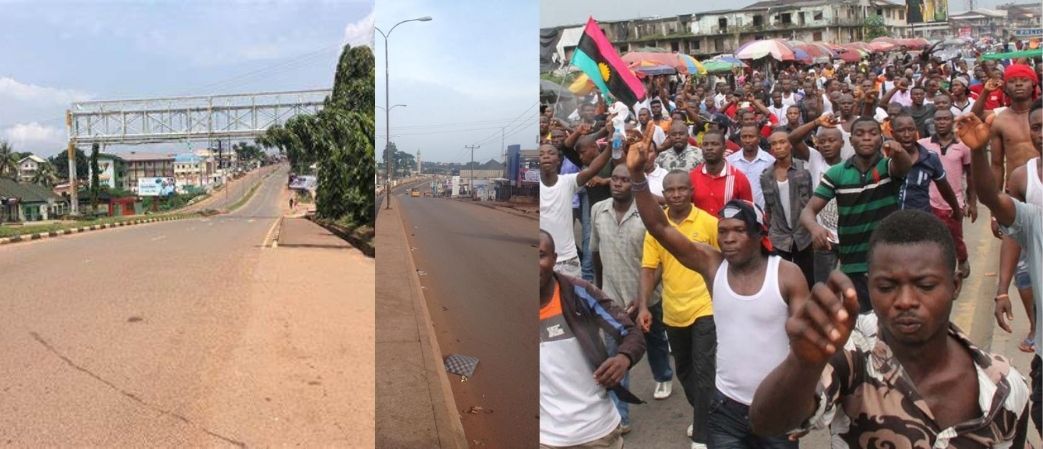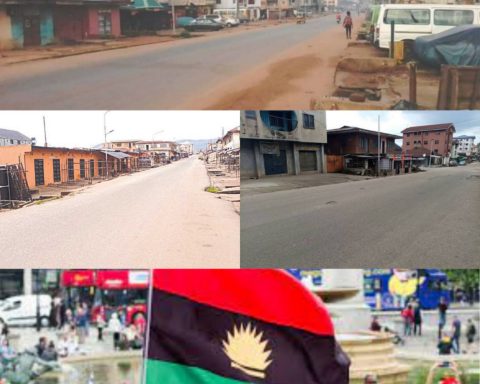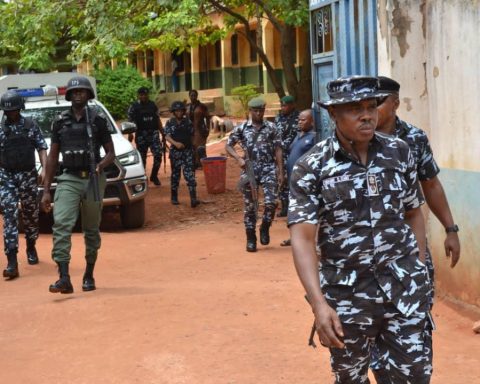The sit-at-home protests in South-east Nigeria, primarily enforced by the Indigenous People of Biafra (IPOB), a separatist group, have had significant economic and social impacts on the region.
These protests, initially declared as a form of civil disobedience to demand the release of IPOB leader Nnamdi Kanu and push for Biafran independence, have evolved into frequent disruptions, often enforced through threats and violence.
Join our WhatsApp ChannelA report by SBM Intelligence says the South-east region has suffered massive losses, including an estimated N7.6 trillion (about $4.6 billion) in economic damage and 776 fatalities in the last four years.
The report titled “Four Years of Disruption: Unmasking the Impact of IPOB’s Sit-at-Home Order in South-east Nigeria”, which emanated from a survey in the region, showed that key sectors like trade, transportation, and SMEs have been crippled, with income losses averaging 50-70 per cent.
It estimated that micro-businesses lost N4.6 trillion annually (as markets, SMEs and supply chains were crippled), transport operators lost between N10 and N13 billion daily during protests.
The report said the survey revealed that while artisans and students were worst hit as they faced business and academic disruptions during sit-at-home days, 90 per cent opposed the protests due to economic harm.
State-by-state analysis of the attacks
The report revealed that the South-east region faces a deepening security crisis with a sharp five-year rise in violence. It said there has been a total of 332 attacks and 776 deaths between 2021 and 2025, with Imo State being the epicentre (130 incidents, 332 deaths), followed by Anambra (94 incidents, 202 deaths).
READ ALSO: Biafra Struggle: Sit-at-home And The Cost Of Heightened Insecurity In Southeast
Abia had 35 incidents, 74 deaths; Enugu recorded 43 incidents, 107 deaths; and Ebonyi had 30 incidents, and 61 deaths.
The weekly sit-at-home, which started in August 2021, will clock four years by August 2025. Since August 2021, sit-at-home orders have been observed every Monday across the five states of Southeast Nigeria—Abia, Anambra, Ebonyi, Enugu, and Imo. Additionally, sit-at-home orders have been declared on days when Nnamdi Kanu was scheduled to appear in court and on other days deemed notable by the group. The orders, which started as an instrument of protest, degenerated into a serious crisis. This has left many residents with little to be desired about the struggle, given the negative economic and social impacts.
READ ALSO: Business Owners Struggle With e-Commerce Despite Weekly Sit-at-home In S’East Nigeria
“No state is spared, but Imo and Anambra are worst hit, linked to IPOB/ESN activity and state responses,” the report stated.
Sources, according to the report, suggested that IPOB, as originally conceived, is not solely responsible for the violent attacks and kidnappings occurring in the region, noting that these groups cashed in on the chaotic situation to carry out criminal activities.
“Apart from the more organised separatist movements, various local criminal gangs have been using the escalating conflict to their advantage. These gangs often engage in kidnappings, armed robbery, and extortion, especially in areas where the state’s security presence is weak.
“Many of these criminal elements, while not directly linked to IPOB or ESN, have capitalised on the fear and confusion to terrorise local populations. Some even claim to be acting on behalf of IPOB or ESN, making it harder to tell the difference between the separatist militants and regular criminals,” the SBM Intelligence report said.
29% Genuinely Support Sit-at-home
According to the report, the SBM Intelligence survey conducted in 2021 revealed that while 82.6 per cent of residents acknowledged complying with the sit-at-home order out of concern for their safety, only around 29 per cent actively supported the directive.
“Many admitted their adherence was driven by fear of violence, a concern validated by IPOB’s enforcement tactics, including arson and killings,” the report noted.
The report further observed that “the government’s heavy-handed response, through military operations like Python Dance and Crocodile Smile, has drawn criticism for alleged rights violations, further straining relations with local communities.”
States’ Severity of Economic Impact
The report shows that economic disruptions were severe in Ebonyi (84 per cent affected) and Enugu (74 per cent). However, resistance grew over time, with 44 per cent of initial supporters becoming lukewarm about future protests.
It revealed that Abia State—Kanu’s home state—registered the least support (21 per cent), “likely due to the lingering impact of military operations like Python Dance and economic pragmatism.”
On the way forward, the report stated that achieving a long-term solution will require more than using law enforcement agents to apply force on protesters. “It demands structural reforms, meaningful political dialogue, and genuine efforts to rebuild trust in the South-east.”
“This sustained emergency demands urgent, coordinated action to prevent further escalation and immense human cost,” it added.
Victor Ezeja is a passionate journalist with seven years of experience writing on economy, politics and energy. He holds a Master's degree in Mass Communication.
















